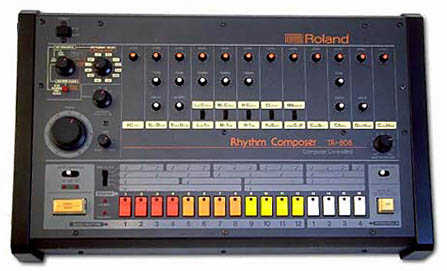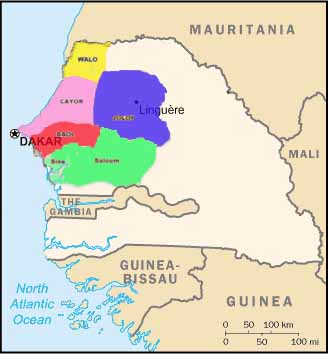|
Footwork (music)
Footwork, also called juke, footwork/juke or Chicago juke, is a genre of electronic music derived from ghetto house with elements of hip hop, first appearing in Chicago in the late 1990s. The music style evolved from the earlier, rapid rhythms of ghetto house, a change pioneered by RP Boo. It may draw from the rapid rhythms and sub-bass frequencies of drum & bass. Tracks also frequently feature heavily syncopated samples from rap, pop and other sources, and are often around 160 bpm. Footwork is also a style of house dance, closely associated with juke music, and typified by very fast and chaotic feet moves. Etymology The name "footwork" given to the genre refers to the footwork dance that accompanies it and is characterized by very fast structured footwork (dance). The arguably first mention of the term "footwork" within the ghetto house scene of Chicago was WaxMaster's "Foot work" track in 1995. ''Footwerk'' and ''footwurk'' are two other forms of the term sometimes used t ... [...More Info...] [...Related Items...] OR: [Wikipedia] [Google] [Baidu] |
Ghetto House
Ghetto house or booty house is a subgenre of house music which started being recognized as a distinct style from around 1992 onwards. It features minimal 808 and 909 drum machine-driven tracks and sometimes sexually explicit lyrics. The template of classic Chicago house music (primarily, "It's Time for the Percolator" by Cajmere) was used with the addition of sexual lyrics. It has usually been made on minimal equipment with little or no effects. It usually features either a " 4-to-the-floor" kick drum or beat-skipping kick drums such as those found in the subgenre "juke" (full sounding, but not too long or distorted) along with Roland 808 and 909 synthesized tom-tom sounds, minimal use of analogue synths, and short, slightly dirty sounding (both sonically and lyrically) vocals samples, often repeated in various ways. Also common are 808 and 909 clap sounds, and full " rapped" verses and choruses. Ghetto house music artists include: DJ Deeon, Jammin' Gerald, DJ Funk, DJ Milt ... [...More Info...] [...Related Items...] OR: [Wikipedia] [Google] [Baidu] |
House Dance
House dance is a freestyle street dance and social dance that has roots in the underground house music scene of Chicago and New York.Phil Cheeseman: "The History Of House" DJ Magazine, 2003. It is typically danced to loud and bass-heavy electronic dance music provided by in or at |
Internet
The Internet (or internet) is the global system of interconnected computer networks that uses the Internet protocol suite (TCP/IP) to communicate between networks and devices. It is a '' network of networks'' that consists of private, public, academic, business, and government networks of local to global scope, linked by a broad array of electronic, wireless, and optical networking technologies. The Internet carries a vast range of information resources and services, such as the inter-linked hypertext documents and applications of the World Wide Web (WWW), electronic mail, telephony, and file sharing. The origins of the Internet date back to the development of packet switching and research commissioned by the United States Department of Defense in the 1960s to enable time-sharing of computers. The primary precursor network, the ARPANET, initially served as a backbone for interconnection of regional academic and military networks in the 1970s to enable resource shari ... [...More Info...] [...Related Items...] OR: [Wikipedia] [Google] [Baidu] |
YouTube
YouTube is a global online video platform, online video sharing and social media, social media platform headquartered in San Bruno, California. It was launched on February 14, 2005, by Steve Chen, Chad Hurley, and Jawed Karim. It is owned by Google, and is the List of most visited websites, second most visited website, after Google Search. YouTube has more than 2.5 billion monthly users who collectively watch more than one billion hours of videos each day. , videos were being uploaded at a rate of more than 500 hours of content per minute. In October 2006, YouTube was bought by Google for $1.65 billion. Google's ownership of YouTube expanded the site's business model, expanding from generating revenue from advertisements alone, to offering paid content such as movies and exclusive content produced by YouTube. It also offers YouTube Premium, a paid subscription option for watching content without ads. YouTube also approved creators to participate in Google's Google AdSens ... [...More Info...] [...Related Items...] OR: [Wikipedia] [Google] [Baidu] |
Imeem
The online service imeem was a social media website where users interacted with each other by Streaming media, streaming, uploading and sharing music and music videos. It operated from 2003 until 2009 when it was shut down after being acquired by MySpace. The company was founded in 2003 by Dalton Caldwell (formerly of Geeknet, VA Linux) and Jan Jannink (formerly of Napster), and many of its core engineering team came from the original Napster file-sharing service. The company takes its name from "meme", a term coined by biologist Richard Dawkins to describe the ideas and cultural phenomena that spread as if they had a life of their own. Helping to pioneer the free, advertising-supported model for online music, imeem permitted consumers to legally upload, stream and share music and music playlists for free with the costs supported by advertising. In 2007, imeem became the first-ever online music site to secure licenses from all four U.S. major music labels to offer their music cata ... [...More Info...] [...Related Items...] OR: [Wikipedia] [Google] [Baidu] |
Peer-to-peer
Peer-to-peer (P2P) computing or networking is a distributed application architecture that partitions tasks or workloads between peers. Peers are equally privileged, equipotent participants in the network. They are said to form a peer-to-peer network of nodes. Peers make a portion of their resources, such as processing power, disk storage or network bandwidth, directly available to other network participants, without the need for central coordination by servers or stable hosts. Peers are both suppliers and consumers of resources, in contrast to the traditional client–server model in which the consumption and supply of resources are divided. While P2P systems had previously been used in many application domains, the architecture was popularized by the file sharing system Napster, originally released in 1999. The concept has inspired new structures and philosophies in many areas of human interaction. In such social contexts, peer-to-peer as a meme refers to the egalitarian so ... [...More Info...] [...Related Items...] OR: [Wikipedia] [Google] [Baidu] |
DJ Rashad
Rashad Harden (October 9, 1979 – April 26, 2014), known as DJ Rashad, was a Chicago-based electronic musician, producer and DJ known as a pioneer in the footwork genre and founder of the Teklife crew. He released his debut studio album '' Double Cup'' on Hyperdub in 2013 to critical praise. He died in April 2014 from a drug overdose. Biography Career Born in Hammond, Indiana on October 1, 1979, Rashad Hanif Harden was the son of Gloria and Anthony Harden."Pitchfork news" Amy Phillips and Evan Minsker, "DJ Rashad Autopsy Inconclusive', ''Pitchfork Media'', April 28, 2014 He grew up on 159th Street in the southern part of , a suburb of Chicago.< ... [...More Info...] [...Related Items...] OR: [Wikipedia] [Google] [Baidu] |
Drum'n'bass
Drum and bass (also written as drum & bass or drum'n'bass and commonly abbreviated as D&B, DnB, or D'n'B) is a genre of electronic dance music characterized by fast breakbeats (typically 165–185 beats per minute) with heavy bass and sub-bass lines, samples, and synthesizers. The genre grew out of the UK's rave scene in the 1990s. The popularity of drum and bass at its commercial peak ran parallel to several other UK dance styles. A major influence was the original Jamaican dub and reggae sound that influenced jungle's bass-heavy sound. Another feature of the style is the complex syncopation of the drum tracks' breakbeat. Drum and bass subgenres include breakcore, ragga jungle, hardstep, darkstep, techstep, neurofunk, ambient drum and bass, liquid funk (a.k.a. liquid drum and bass), jump up, drumfunk, sambass, and drill 'n' bass. Drum and bass has influenced many other genres like hip hop, big beat, dubstep, house, trip hop, ambient music, techno, jazz, rock and pop. Dr ... [...More Info...] [...Related Items...] OR: [Wikipedia] [Google] [Baidu] |
Jungle
A jungle is land covered with dense forest and tangled vegetation, usually in tropical climates. Application of the term has varied greatly during the past recent century. Etymology The word ''jungle'' originates from the Sanskrit word ''jaṅgala'' (), meaning rough and arid. It came into the English language via Hindi in the 18th century. ''Jāṅgala'' has also been variously transcribed in English as ''jangal'', ''jangla'', ''jungal'', and ''juṅgala''. Although the Sanskrit word refers to dry land, it has been suggested that an Anglo-Indian interpretation led to its connotation as a dense "tangled thicket", while others have argued that a cognate word in Urdu derived from Persian, جنگل (Jangal), did refer to forests. The term is prevalent in many languages of the Indian subcontinent, and the Iranian Plateau, where it is commonly used to refer to the plant growth replacing primeval forest or to the unkempt tropical vegetation that takes over abandoned areas. History ... [...More Info...] [...Related Items...] OR: [Wikipedia] [Google] [Baidu] |
Wolof Language
Wolof (; Wolofal: ) is a language of Senegal, Mauritania, and the Gambia, and the native language of the Wolof people. Like the neighbouring languages Serer and Fula, it belongs to the Senegambian branch of the Niger–Congo language family. Unlike most other languages of the Niger-Congo family, Wolof is not a tonal language. Wolof is the most widely spoken language in Senegal, spoken natively by the Wolof people (40% of the population) but also by most other Senegalese as a second language. Wolof dialects vary geographically and between rural and urban areas. The principal dialect of Dakar, for instance, is an urban mixture of Wolof, French, and Arabic. ''Wolof'' is the standard spelling and may also refer to the Wolof ethnicity or culture. Variants include the older French , , , Gambian Wolof, etc., which now typically refers either to the Jolof Empire or to jollof rice, a common West African rice dish. Now-archaic forms include ''Volof'' and ''Olof''. English is believed ... [...More Info...] [...Related Items...] OR: [Wikipedia] [Google] [Baidu] |
Gullah Language
Gullah (also called Gullah-English, Sea Island Creole English, and Geechee) is a creole language spoken by the Gullah people (also called "Geechees" within the community), an African-American population living in coastal regions of South Carolina and Georgia (including urban Charleston and Savannah) as well as extreme northeastern Florida and the extreme southeast of North Carolina. Origins Gullah is based on different varieties of English and languages of Central Africa and West Africa. Scholars have proposed a number of theories about the origins of Gullah and its development: # Gullah developed independently on the Sea Islands off the coast of the Carolinas, Georgia, and Florida throughout the 18th and 19th centuries by enslaved Africans. They developed a language that combined grammatical, phonological, and lexical features of the nonstandard English varieties spoken by that region's white slaveholders and farmers in that region, along with those from numerous Western and ... [...More Info...] [...Related Items...] OR: [Wikipedia] [Google] [Baidu] |



